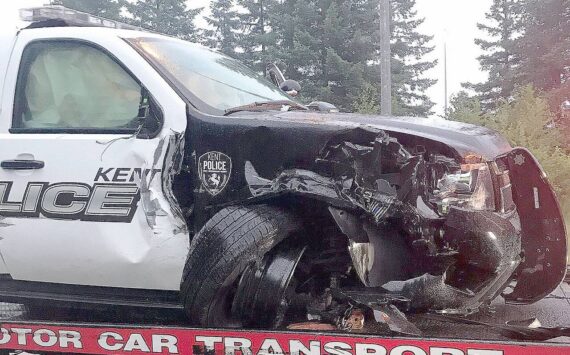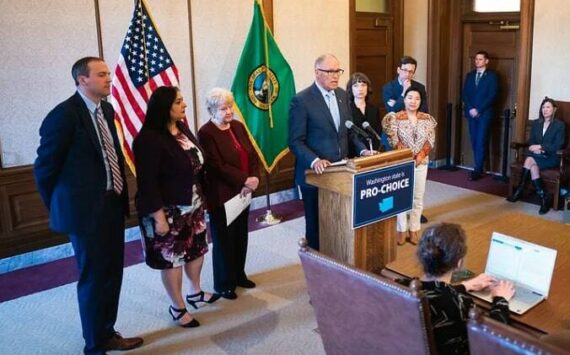OLYMPIA — As lawmakers creep toward finding agreement on a new state budget by the end of the month, preparations are ramping up to shutter a slew of public services if they fail.
They must deliver the two-year spending plan to Gov. Jay Inslee before July 1 to avert a partial government shutdown that would result in actions such as the closure of state parks, less community supervision of some convicted sex offenders and the layoff of roughly 26,000 employees.
But a deal is proving elusive as they make their way through a second special session. The Democrat-controlled House and Republican-led Senate are once again at odds on the level of spending in the biennium that runs through mid-2019.
Legislators beat the clock under similar pressure in 2015 and 2013. Those in office then are confident they’ll do it again.
“I trust my colleagues on both sides of the aisle in both chambers to lead us to an agreement by the end of the month,” said Sen. Marko Liias, D-Lynnwood. “I have confidence they will continue to posture for a little bit longer and then they will get to a compromise on an agreement.”
Senate Majority Leader Mark Schoesler, R-Ritzville, acknowledged “it’s a challenge” to wrap everything up in the current special session that ends June 22 but his confidence level is “very high” the work will be done in time to prevent a shutdown.
Newcomers, however, worry they won’t make it in time.
Freshman Sen. Guy Palumbo, D-Maltby, described the level of his concern as “extremely high.”
“I fully expect us to go right up to July 1,” he said. “The two sides aren’t even remotely close to each other on revenue. We’re just in a high-stakes chicken match between Senate Republicans and House Democrats.”
And Inslee’s budget director said Friday that what happens this coming week is pivotal.
“We are going to have to get them in the room together,” said David Schumacher, director of the Office of Financial Management, who has been conducting a sort of shuttle diplomacy between budget writing teams of the two chambers. “The governor is starting to get a little nervous that they’re not going fast enough to get this done.”
Search for solution
Sunday marked lawmakers’ 155th day in session in 2017—105 in regular session, 30 in a first extra period and 20 so far in a second overtime.
The chief hang-up, as it has been since January, is figuring out what it will take to amply fund public schools in line with the state Supreme Court dictates of the McCleary case. There’s no dispute it will mean pumping billions of additional dollars into the system in the next few years.
But the two sides have yet to agree on exactly how much it will be, how fast to pour it in and whether those dollars will come from new and higher taxes or from the state’s existing sources of revenue.
“It is really just a math problem,” Palumbo said. “It’s the same problem we had on Jan. 9. It just hasn’t been solved yet.”
Eight lawmakers have been trying to do so since March and reportedly are near consensus on policy changes that will determine the dollar amount. In the meantime, other groups of legislators are working to reconcile differences on other components of the budget, such as spending on mental health, homelessness and natural resources.
But as Schumacher noted, the chief House and Senate budget writers are not holding face-to-face meetings or exchanging the kind of detailed offers that result in a final agreement.
“You have to really finish McCleary and K-12 because it is a majority of the budget, before you can finalize other areas of the budget,” Schoesler explained.
More than McCleary
There are other matters to resolve.
House Democrats want to stop requiring high school students pass assessment tests in English, math and biology to graduate while Senate Republicans are only willing to cross out biology.
Senate Republicans want to reform the collective bargaining process with state workers before giving them pay hikes negotiated by Inslee and backed by House Democrats.
And there’s broad desire to rewrite the rules governing water rights in response to the Supreme Court’s decision in the Hirst case. But Senate Republicans and House Democrats can’t agree on the right path and the GOP won’t negotiate on a new capital budget until they find it.
In some previous years, this is the point when legislative leaders and the governor meet to clear away obstacles in the process. Not this year.
Schoesler said it’s been “months” since he’s met with House Speaker Frank Chopp, D-Seattle. And Inslee did not meet or speak with leaders of the House or Senate last week, according to his staff. Schumacher, however, said he and his staff are in continual contact with both sides and encouraging them to get together.
Rep. Derek Stanford, D-Bothell, who endured the near-shutdown experiences in 2015 and 2013, isn’t without hope that last-minute success can be achieved again.
“Progress is being made. There’s movement but it’s not fast enough,” he said. “Making it move faster is the trick.”
He’s also not certain.
“It depends on how much the Republicans are willing to push us to a shutdown. It depends on how much Democrats are willing to push us to a shutdown,” he said. “I would hope everybody can be an adult and say we have to get to something everyone can support.”
Some Republican senators are pondering a continuing resolution to keep state agencies operating if the July 1 deadline is missed. They envision a short-term funding mechanism along the lines of what Congress routinely approves when it cannot enact a federal spending plan on time.
“That’s being talked about right now,” said Sen. Barbara Bailey, R-Oak Harbor. “My hope is we’ll come to consensus on an agreement sooner than later.”
Democrats don’t want a short-term fix.
“I would never vote for it because then the nightmare would never end,” said Sen. Steve Hobbs, D-Lake Stevens.
Schumacher said it’s a non-starter.
“I think talking about a continuing resolution is somewhat of a cop-out,” he said. “We’re trying to get this thing done, not give them a way out.”
This story originally ran in the Everett Herald.







